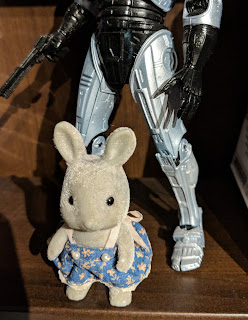Book vs. Movie: True Grit
I saw "True Grit" in the theater back in December, and I liked the movie so much that I sought out the novel. As it turns out, I almost didn't need to bother.
Premise: 14-year-old Mattie Ross is determined to see Tom Chaney die for the murder of her father. She hires the meanest Federal Marshal in Fort Smith to hunt her quarry, and intends to go with him to see it done.
 The novel and the movie are each a delight, although this is one of those cases in which the adaptation is so close that to experience both almost feels like overkill. The movie takes much of its dialogue straight from the page.
The novel and the movie are each a delight, although this is one of those cases in which the adaptation is so close that to experience both almost feels like overkill. The movie takes much of its dialogue straight from the page.There are a couple scenes that play out slightly differently, but I think the movie might have the edge in these because it always takes the more dramatic option.
The language is simply fantastic. Mattie is a great character, one you're drawn to admire, but she's prickly and cares nothing for your regard. She narrates both the book and the film in her decisive tone, though in the book she has a few more asides about behavior unbecoming of Presbyterian folk.
On receiving a letter regarding her father's funeral:
If you want anything done right you will have to see to it yourself every time. I do not know to this day why they let a wool-hatted crank like Owen Hardy preach the service. Knowing the Gospel and preaching it are two different things. A Baptist or even a Campbellite would have been better than him. If I had been home I would never have permitted it, but I could not be in two places at once.The book is full of this ironic humor, occasionally at Mattie's expense when she misunderstands something, but mostly just brought out organically from her strong unvarnished opinions. The other main characters: Marshal Cogburn and LaBoeuf the Texas Ranger, are both great personalities, but it's Mattie's unerring voice that makes this story shine.
A few more choice bits:
Cogburn after shooting a rat:
“You can't serve papers on a rat, baby sister.”
“I never said you could.”
“These shitepoke lawyers think you can but you can't. All you can do with a rat is kill him or let him be. They don't care nothing about papers. What is your thinking on it?”
“Are you going to drink all that?”
Mattie dealing with a shopkeeper:
He said, “I just received word that a young girl fell head first into a fifty-foot well on the Towson Road. I thought perhaps it was you.”
“No, it was not I.”
“She was drowned, they say.”
“I am not surprised.”
“Drowned like the fair Ophelia. Of course with her it was doubly tragic. She was distracted from a broken heart and would do nothing to save herself. I am amazed that people can bear up and carry on under these repeated blows. There is no end to them.”
“She must have been silly.”
The afterword to the edition I read makes another good point about the book: it expertly straddles that time when the after-echoes of the Confederacy were fading into the stories of the West, and then the Wild West was in turn fading into legend.
See or read this. You'll be glad you did.
Book: 4 Stars – A Really Good Book
Movie: Just as good if not better.



It's good to hear that the screenwriters stayed close to the book. I met Seth Margolis at a conference. He wrote Raising Isaiah and said he was disappointed how much the film was changed, they even changed the ending. This happens far too often. Great review of True Grit - thanks.
ReplyDeleteAnn
I bought the book this year at a library sale, but sadly I packed it away in a box because of a remodel before I could read it. I'm a fan of the John Wayne version of True Grit and have not seen the new movie yet. Thanks for your thoughts.
ReplyDeleteTwo thumbs up on the book and movie(s).
ReplyDeleteReading the book enabled one to savor the dialogues that Portis wrote.
Reading also strengthened the Coen Brother's choice of Leaning on the Everlasting Arms as the theme music.
Had not heard "Campbelite" and "Cumberland Presbyterian" in decades.
My Mother was born in Pickle Gap Arkansas 1906